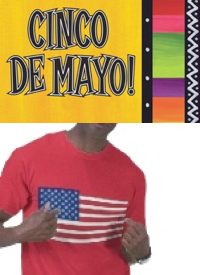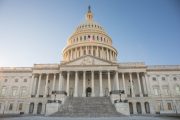
When a group of students at a California high school elected to wear patriotic American-flag T-shirts to school on Cinco de Mayo (May 5), a Mexican holiday, they were told by their principal to turn their shirts inside out so as not to offend the school’s Hispanic students. The students took their case to court; however, last week a U.S. District Judge James Ware of San Francisco ruled that the school was well within its rights to make the students hide the U.S. flags on their T-shirts.
Three students appeared at Live Oak High School at the Morgan Hill Unified School District on May 5, 2010 wearing T-shirts adorned with the American flag. Assistant principal Miguel Rodriguez asked the students to either remove their shirts or turn them inside out. When the students refused to comply, Rodriguez ordered them to principal Nick Bodens office. After discussing the subject with the students for well over an hour, the principal sent them home for the day.
The Blaze reports, The Rutherford Institute and the Thomas More Law Center teamed up to represent the students and their families.
This is nothing more than political correctness, declared John Whitehead, president of Rutherford. If these kinds of decisions are upheld, they will destroy our First Amendment rights.
Recognizing an infringement on their constitutional rights, the students and their families filed a lawsuit, wherein they accused officials of violating their First and Fourteenth Amendment rights as well as the standard set by the Supreme Court in 1969, which declared that students had the right to wear black armbands to class in silent protest against the Vietnam War. That ruling affirmed that schools could not suppress student expression simply because it might cause disruption.
Bill Becker, the California high school students lawyer, compared the wearing of armbands in the 1969 case to the wearing of T-shirts in the present-day case. He asserted that the school should not be permitted to interfere with the students freedom of expression simply because the patriotic message may offend [some] students, particularly as the school officials placed no such restrictions on the Mexican-American students wearing shirts bearing Mexican flags.
The lawsuit sought to make the school change its policy on students rights and protections so that it adheres to the Bill of Rights; as well, it asked that the school district reimburse the students for the lawyers’ fees and expenses pertaining to the litigation.
Judge Ware cited clashes between white students and Mexican students on the dates of previous Cinco de Mayo celebrations and determined that the school had reasonably forecast that [the T-shirts] could cause a substantial disruption, ruling that the school was entitled to take any steps it deemed fit.
Last year, for example, a verbal and physical altercation took place between Anglo and Mexican students at the school. Fox News explains,
The case arose in an ethnically charged atmosphere at Live Oak High School in Morgan Hill. On the previous Cinco de Mayo, Ware said, a group of Mexican-American students walked around with a Mexican flag, and a group of Anglo students responding by hoisting a makeshift American flag up a tree, chanting USA and exchanging profanities and threats with the Latino youths.
The judge indicated that though the Supreme Court has ruled that students may engage in non-disruptive free speech, the ruling does not require that school officials wait until disruption occurs before they act. He claimed that post-1969 rulings by federal courts have typically deferred to the conclusions made by school officials, and ultimately dismissed the lawsuit filed by the students.
Becker said he would appeal this bizarre ruling, telling the San Francisco Chronicle,”The court found that the rights of students promoting their Mexican heritage trumped the rights of students expressing their [American] patriotism.” He pointed out that if the school was in fact concerned over safety, it should have cancelled all observance of Cinco de Mayo and not simply singled out the Anglo students.
According to Eugene Volokh, professor of free speech law, criminal law, tort law, religious freedom law, and church-state relations law at UCLA School of Law, the judges decision may be upheld:
The decision might well be correct under Tinker v. Des Moines Independent Community School Dist. (1969), which allows a “heckler’s veto” in K-12 school: Schools may indeed restrict student speech when it’s likely to cause substantial disruption, even when the disruption stems from other students’ hostility to the speech. As I mentioned in an earlier post, I think the speech restriction violates a California statute that gives students extra protection, but that claim wasn’t raised in this federal lawsuit.
Yet while the judge might have been right in his decision, the situation in the school seems very bad. When we’re at the point that students can’t safely display the American flag in an American school, because of a fear that other students will attack them for it on May 5 or on any other day and the school feels unable to prevent such attacks (by punishing the threateners and the attackers, and by teaching students tolerance for other students’ speech), something is badly wrong.
Agreeing with Volokh, the American Thinker writes, Why not ban all flags and attire that features flags? Why allow the Mexican flag to be displayed at all? Its what happens when you have lickspittles running schools who dont want to offend a minority.
Some observers have pointed out that it brings up the question once again of whether it is even the role of either the federal government, local government, or in this case, the schools, to ensure that people remain un-offended. As noted by conservative pundit Glenn Beck, There is no [constitutional] right to not be offended.
The lawyer for the school district, Mark Posard, celebrated Wares decision, declaring that it affirmed that school safety is paramount.
Wares reaction to the decision reflects a marked change from the district’s initial response following the incident, when Superintendent Wesley Smith observed, This has certainly been a very difficult time for our school district. School leaders have to make judgment calls on when to take preventative measures to pre-empt a possible incident or conflict. In this situation, it appears that a decision was made too quickly.


